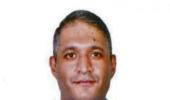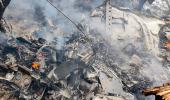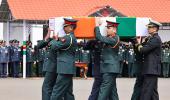To ensure the morale of the pilots does not suffer, flying activity continues without a pause.
Pilots take to the sky like they would on any other day.

The 109 Helicopter Unit at the Sulur air force station near Coimbatore lost four air warriors in the fatal helicopter crash in Coonoor on December 8.
Commanding Officer Wing Commander Prithvi Singh Chauhan along with Squadron Leader Kuldeep Singh, Junior Warrant Officers Pradeep A and Rana Pratap Das perished in the tragic accident.
The commanding officer is the most experienced pilot of the unit. Referred to as the 'CO', he is responsible for every activity that takes place in his unit.
The Mi-17V5 helicopter left Sulur at 11.48 am and was scheduled to reach Wellington at 12.15 pm. The aircraft lost contact at 12.08 pm and crashed.
On any other day, the Mi-17V5 would have returned to base at the completion of the VIP mission.
But the sortie on December 8 met an unfortunate end.
Chief of Defence Staff General Bipin Rawat, Mrs Madhulika Rawat, Brigadier L S Lidder, Lieutenant Colonel Harjinder Singh, Havildar Satpal Rai, Lance Naik Vivek Kumar, Lance Naik Sai Teja, Naik Jitender Kumar, Naik Gursevak Singh -- along with the four IAF personnel returned to Sulur by road draped in the national flag the next day.
The lone survivor, Group Captain Varun Singh, a decorated pilot who is an instructor at the Defence Services Staff College at Wellington, underwent three surgeries and is being treated at the Air Force Command Hospital in Bengaluru.
Indian Air Force officers and men are no strangers to losing personnel in the line of duty, but any loss of life leaves a pall of gloom in its wake.
"When a fighter jet has a fatal crash, one or two pilots are lost, but when a transport aircraft crashes, the casualties are higher," says Wing Commander K Dinesh (retd), who served four years at the Sulur Air Force station.
"It affects every corner of the air force station and can be devastating, but all military units are resilient and rise to the occasion."
"That is how we are trained."
"We know that we will lose fellow officers and men in the line of duty. The unit bravely confronts the loss and resumes its duties -- nothing can be compromised," he continues.
To ensure the morale of the pilots does not suffer after an air accident, the flight commander or the unit's second in command gathers the officers and give them a morale boosting talk.
Flying activity in the squadron continues as scheduled without a pause. Pilots take to the sky like they would on any other day.
When a CO dies in harness, his deputy takes charge while Air Headquarters immediately posts an officer to replace the deceased.
When the mortal remains are brought back to the base, a funeral parade is organised before the bodies are sent to their homes.
The closely knit community rallies around the bereaved families. The wives of the unit play a vital role during the moment of loss.
The spouse of the air officer commanding or the flight commander accompany senior officers and gently break the news to the families.
The wives of the junior commissioned and lower ranks follow the same protocol.
A similar protocol is followed in the Indian Army.
Immediate monetary relief is provided by the Air Force Wives Welfare Association and the Army Wives Welfare Association.
The unit clears all dues and a group of officers is constituted to help the bereaved family in all aspects.
If their belongings have to sent to their homes, a list is made of all articles and packed in boxes ready for dispatch.
The wives and children can continue living in the official accommodation at the air force base or any other air force station in the country for the next three years.
The unit also helps them look for accommodation outside if the wives so desire.
"The unit remains in touch with them throughout their lives and extends them whatever help they may need," says an air force officer.
"They are invited for every unit function and remain a part of the IAF family."
Feature Presentation: Aslam Hunani/Rediff.com











 © 2025
© 2025